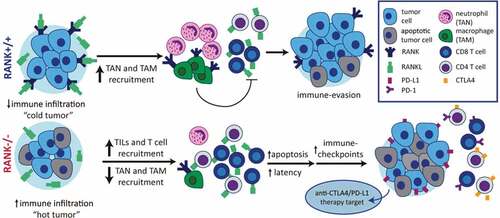Figures & data
Figure 1. The RANK pathway as immune modulator in breast cancer. RANK expression in luminal breast cancer cells leads to the expression of pro-inflammatory cytokines/chemokines favoring recruitment of tumor associated-macrophages (TAMs) and neutrophils (TANs), immunosuppressive populations which interfere with lymphocyte T cell recruitment and/or activity. Denosumab (anti-RANKL) or RANK signaling inhibition results in increased TILs, lymphocytes and CD8+ T cell infiltration, transforming immune “cold” tumors into “hot” ones and attenuating tumor growth. Eventually the exacerbated immune response driven by RANK inhibition will induce the expression of immune checkpoints evading immune surveillance and allowing tumor growth. These results support the benefit of combining RANKL and immune checkpoint inhibitors in luminal breast cancer

